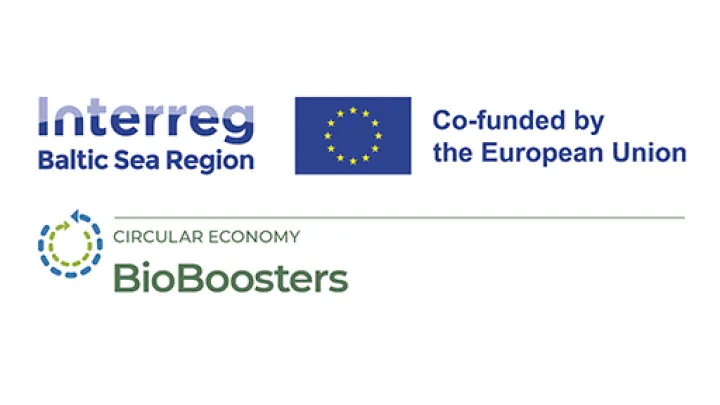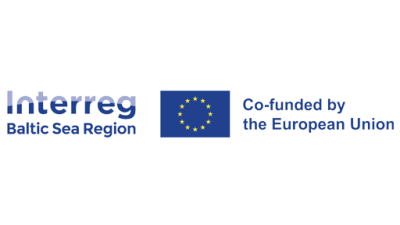Project
BioBoosters - Boosting Circular transition
Project sponsors
Interreg BSR core project, priority 3.1 Circular economy
2023-2025
Launched in January 2023, BioBoosters – Boosting Circular Transition – project connects 9 regions with strong bioeconomy innovation ecosystems to help circular bioeconomy business transition in Baltic Sea Region. The 3-year project is co-financed by the Interreg Baltic Sea Region programme from the European Regional Development Funds.
The partnership involves:
Jamk University of Applied Sciences FI (lead partner)
Paper Province SWE
Biofuel Region SWE
Vidzeme Planning Region LAT
Estonian University of Life Sciences EE
Witeno GER
Pärnu County Development Center EE
Foundation for Education and Social Dialogue 'PRO CIVIS' PL
Sunrise Valley Science and Technology Park LT
CHALLENGE
Biobased businesses are well positioned to join, support, or even lead the transition to circular economy business models that are vital to building climate neutral societies. However, especially in the traditional bioeconomy companies in rural regions, there remains several challenges hindering the uptake and full-scale leveraging of the circular economy business models. These include lack of access to talent, expertise, networks, and innovation services that are especially challenging for rural regions.
In addition, circular economy business models can require tapping into cross-disciplinary knowhow, e.g., digital service solutions and service design, or building co-operation across regions to manage the material and energy streams. Traditional biobusiness companies often lack a culture of co-operation as well as platforms for building co-operation. Co-operation may occur between local colleagues, but it can be a challenge to connect with new know-how, talent, and expertise across sectors due to limited connections in the rural area. Meanwhile, innovative SMEs from e.g. ICT sector do not effectively recognize potential market opportunities in the traditional bioeconomy sectors due to the disconnection between rural and urban networks.
SOLUTION
As a solution, BioBoosters project pilots an international hackathon model as a demand driven innovation process aiming to solve challenges that bioeconomy companies are facing when transitioning to circular economy business models by matching the companies with potential solution providers. Hackathon offers a tool for the bioeconomy innovation hubs to connect their client companies with the best available talent, expertise, and solutions in the 9 of the leading, and upcoming, bioeconomy innovation ecosystems of the Baltic Sea Region. The hubs will pool their networks and human resources to better service the business in all connected regions.
With the hackathon service, the project helps large bioeconomy enterprises to tap into key enabling technologies and innovative solutions to transition to circular economy business models. The hackathon process connects to companies to knowhow and partners that can solve transition challenges such as need to:
improve data collection and flow in the value chain
find use for the biobased side streams and create new value chains
switch to biobased materials or to find more sustainable alternatives the current materials and ingredients
identify suitable (ICT) solutions to shift to ‘product as a service' or sharing models to create more value for customers
LONG-TERM VISION
The involved partners are bioeconomy innovation hubs that represent bioeconomy innovation ecosystems around Baltic Sea Region. The partnership represents a wide range of mutually supportive bioeconomy and circular economy expertise. All involved hubs are drivers of their regional smart specialization strategy in bioeconomy or its subsectors. They have a long-term interest to co-operate and build a joint innovation process supporting growth in sustainable bioeconomy.
Project results
BioBoosters aims to advance the green transition of bioeconomy business by matchmaking competence with needs. By employing a proven business-driven Hackathon process, we can solve challenges that the bioeconomy businesses are facing in transitioning to circular economy business models.
BioBoosters Hackathon is connecting the bioeconomy innovation ecosystems of 9 regions across the Baltic Sea Region. By implementing the open innovation process in inter-regional co-operation, we can facilitate cross-sectoral knowledge transfer as well as connect SMEs, start-ups, and research groups with companies in an international context.
We have run 18 BioBoosters Hackathons together with target groups to validate the innovation process model to be adopted in the key bioeconomy innovation hubs of the participating regions. Furthermore, the model will be transferrable to any innovation hub that is looking to support their regional business networks in green or digital transition.
Our impact in numbers:
-
18 Business-driven Hackathons have validated up to 120 solutions to circular transition challenges
-
246 teams from 20+ countries applied to take part with their solution ideas
-
23 RDI and business co-operations initiated - including 13 international co-operations
-
Over 500 specialist brought together to drive the circular transition of the bioeconomy in the Baltic Sea Region – over 1,700 specialists connected at BioBoosters LinkedIn community
-
98 per cent of the surveyed challenge provider representatives reported that they got a promising solution for solving their challenge. (n= 46)
-
95 per cent of the solution provider respondents reported that they have gained knowhow from mentoring and 94 per cent agree that BioBoosters Hackathon is a good tool to build partnerships for idea testing and commercialisation. (n=160)
-
94 % agree that BioBoosters Hackathon supports green transition in the Baltic Sea Region.
-
93 % agree that BioBoosters Hackathon supports growth in bioeconomy sectors in the Baltic Sea Region.
-
92% agree that BioBoosters Hackathon supports exchange and transfer of best practices across the Baltic Sea Region.
Read more about Hackathons!
BioBoosters project in Interreg BSR web pages: https://interreg-baltic.eu/project/bioboosters/

